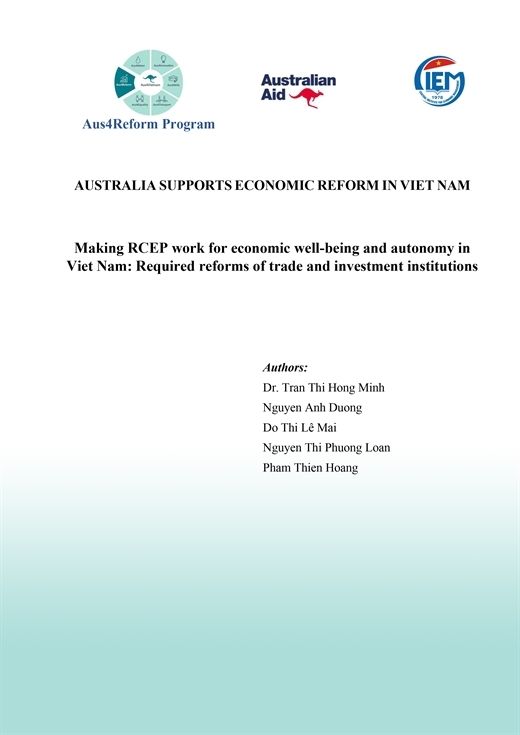Australia supports Economic Reform in Vietnam (Aus4Reform)
- en
- Library
- Economic Restructuring and Business Enabling Environment
- Making RCEP work for economic well-being and autonomy in Viet Nam: Required reforms of trade and investment institutions
Publications - Reports

22/2/2021
Making RCEP work for economic well-being and autonomy in Viet Nam: Required reforms of trade and investment institutions
Making RCEP work for economic well-being and autonomy in Viet Nam: Required reforms of trade and investment institutions
Making RCEP work for economic well-being and autonomy in Viet Nam: Required reforms of trade and investment institutions
Despite facing various difficulties and negative economic consequences due to the COVID-19 pandemic in 2020, Viet Nam continued active and comprehensive efforts towards international economic integration. Viet Nam has successfully accomplished its role as ASEAN Chair 2020; ratified and implemented the EU – Viet Nam Free Trade Agreement (EVFTA); and signed Regional Comprehensive Economic Partnership (RCEP) Agreement. Unlike high-quality trade agreements such as EVFTA or Comprehensive and Progressive Agreement for Trans-Pacific Partnership (CPTPP), Viet Nam participates in the RCEP with a more “gradualism” approach. The debate on the impact of international economic integration - especially trade, foreign investment, etc. - has become more “multidimensional”; in that context, the impacts of RCEP were perceived to include both positive and negative aspects. Besides the articulated net benefits of RCEP, there are material concerns about the modest impact of this Agreement on Viet Nam’s institutional quality. In addition, after prolonged trade deficit with RCEP members and the disruptive impact of the COVID-19 pandemic on the supply chain, an emerging policy issue is how to improve the economic autonomy of Viet Nam upon implementing RCEP.
This Report elaborates on the institutional requirements to making RCEP work for economic well-being and autonomy in Viet Nam. The report was prepared by the research team of the Central Institute for Economic Management with the support of the Australian Program to Support Vietnam Economic Reform (Aus4Reform).

